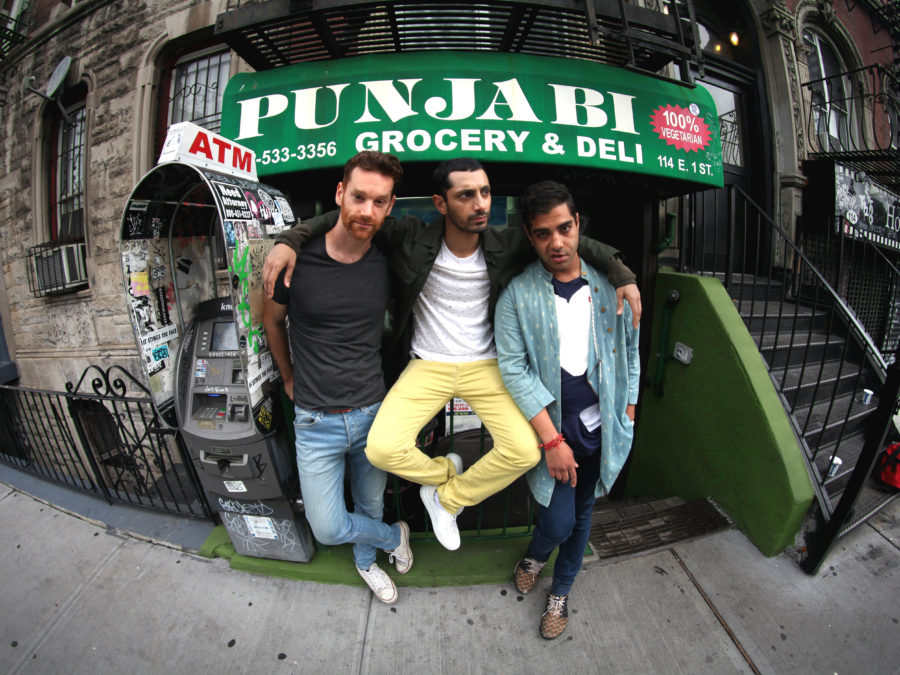Note: NPR’s First Listen audio comes down after the album is released. However, you can still listen with the Spotify playlist at the bottom of the page.
Kanye West and Jay Z. Drake and Future. Lil Wayne and 2 Chainz. Sure, you may be able to name a more iconic hip-hop duo than The Swet Shop Boys — Riz MC and Heems — but you’d be hard-pressed to name a pair better suited to address social justice and the unique experience of South Asian people in the U.S. and U.K.
Heems, a.k.a. Himanshu Suri, is an Indian-American rapper, activist and New York City native. His counterpart is Riz MC, a.k.a. Rizwan Ahmed, an actor/rapper of Pakistani descent from London (you might recognize him from his starring role in HBO’s hit miniseries The Night Of). Heems is Hindu and Riz is Muslim. Though separated by religion, nationality and the Atlantic Ocean, the two find common ground in hip-hop and engage head-on with a post-9/11 world that’s fraught with government surveillance, Islamophobia, xenophobia, police violence and racism. Swet Shop Boys’ album, Cashmere, is political and poignant at times, but it’s never heavy-handed, thanks to a healthy dose of humor and the Desi-inflected sonic palette of the album’s sole producer, Redinho.
Cashmere is a project about identity and perspective in both its sound and its content. In “Shottin’,” over a synthy slapper of a beat by Redinho, Heems plays the role of an ex-drug dealer whose newfound faith has made him a target: “I was at the mosque and the feds came and shot me / Stopped sellin’ drugs, but they still tryin’ to stop me / I had crack in the stairwell / Then I found God in a jail cell / Yankee hat to kufi on top / Still dealin’ with these goofy-ass cops.” The storytelling continues in “Shoes Off,” in which Riz tells the tale of a good kid turned radical: “MI5 is givin’ the boy stress / Now he in Syria, lookin’ to fight West.” The characters in Swet Shop Boys’ stories reflect seldom-spoken truths and contradictions about the world, and when they get personal, the revelations are just as intriguing.
On his 2015 solo record Eat Pray Thug, Heems rapped, “I’m so New York, I still don’t bump Tupac,” banging his chest with NYC pride. But here, in “Half Moghul Half Mowgli,” Riz counters with his own take on the late rapper. In the process, he demonstrates how hip-hop has become the lingua franca of marginalized people around the globe: “Brown stepson of the Black Panthers / I’m not Bagheera, I’m Mowgli / My only heroes are black rappers / So to me Tupac was a true Paki.”
The album’s depth is often tempered with levity. In “Terminal 5,” they address the topic of traveling while brown and interpolate a chorus from British pop-punk duo Shampoo to get their point across: “Oh, no! We’re in trouble / TSA always wanna burst my bubble / Always get a random check when I rock the stubble.”
Throughout Cashmere, Riz and Heems subvert stereotypes while inspiring critical thinking with humor and humanity. They’re not really concerned with being an “iconic duo.” They’d much rather be iconoclasts.
9(MDAxNzk1MDc4MDEyMTU0NTY4ODBlNmE3Yw001))
Playlist
Swet Shop Boys, 'Cashmere'



